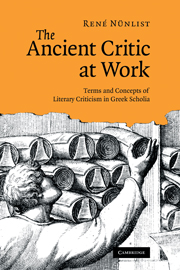Book contents
- Frontmatter
- Contents
- Acknowledgments
- Introduction
- PART I
- 1 Plot
- 2 Time
- 3 Narrative and speech
- 4 Focalisation
- 5 Effects on the reader
- 6 Gaps and omissions
- 7 Poetic licence
- 8 Authentication
- 9 Style
- 10 Allusions, hints, hidden meanings
- 11 Characters
- 12 Mythography
- PART II
- Epilogue
- Glossary of Greek terms
- Editions of scholia
- Other abbreviations
- Bibliography
- Thematic index
- Index locorum
4 - Focalisation
Published online by Cambridge University Press: 29 August 2009
- Frontmatter
- Contents
- Acknowledgments
- Introduction
- PART I
- 1 Plot
- 2 Time
- 3 Narrative and speech
- 4 Focalisation
- 5 Effects on the reader
- 6 Gaps and omissions
- 7 Poetic licence
- 8 Authentication
- 9 Style
- 10 Allusions, hints, hidden meanings
- 11 Characters
- 12 Mythography
- PART II
- Epilogue
- Glossary of Greek terms
- Editions of scholia
- Other abbreviations
- Bibliography
- Thematic index
- Index locorum
Summary
Questions of focalisation (or point of view) are of considerable importance in ancient literary criticism, and various aspects are discussed in the scholia. The best-known is probably the interpretative principle that is often referred to by the expression λύσις ἐκ τοῦ προσώπου (lit. ‘solution from the character’). Its point is that if one takes into account in each case who the speaker is, contradictions in a text can often be proven to be apparent only because the speakers are not identical. As Porphyry puts it:
οὐδὲν δὲ θαυμαστὸν εἰ παρὰ τῷ ποιητῇ ἐναντία λέγεται ὑπὸ διαΦόρων Φωνῶν. ὅσα μὲν γὰρ ἔΦη αὐτὸς ἀΦ᾿ ἑαυτοῦ ἐξ ἰδίου προσώπου, ταῦτα δεῖ ἀκόλουθα εἶναι καὶ μὴ ἐναντία ἀλλήλοις· ὅσα δὲ προσώποις περιτίθησιν, οὐκ αὐτοῦ εἰσιν ἀλλὰ τῶν λεγόντων νοεῖται, ὅθεν καὶ ἐπιδέχεται πολλάκις διαΦωνίαν, ὥσπερ καὶ ἐν τούτοις.
(Porph. on Il. 6.265, I 100.4–9 Schrader)No wonder when in Homer different things are said by different voices. Whatever is said by the poet in propria persona should be consistent and not contradictory. All the words/ideas he attributes to the characters are not his, but are understood as being said by the speakers. This often leads to an (apparent) contradiction, as in the present case.
From this it follows that exception should not be taken to such contradictions (in the present case: the different views of Hecuba and Hector as to whether or not wine has a strengthening effect).
- Type
- Chapter
- Information
- The Ancient Critic at WorkTerms and Concepts of Literary Criticism in Greek Scholia, pp. 116 - 134Publisher: Cambridge University PressPrint publication year: 2009



